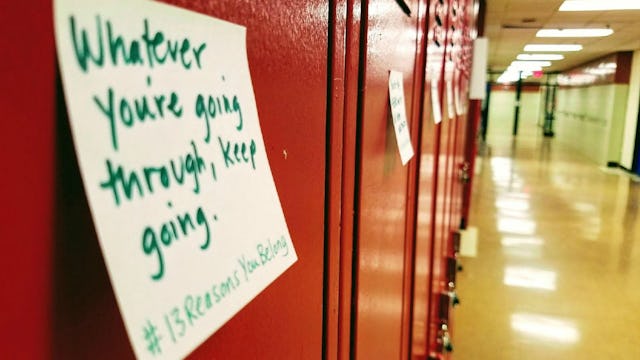#13ReasonsYouBelong: A Message My Students And I Would Like To See Spread Across Your Campus

I wish Hannah Baker had just made it to college. She would have seen that life doesn’t end at 18, and that you can remake yourself in some way outside of the life, trauma, town, or school you think you’re stuck in right now.
If only Clay or Mr. Potter — or any of the teachers or her parents! — had been able to listen longer or say just the right thing, Hannah might have ended up with a story to tell rather than a tape to listen to.
If only these kids had heard the right phrase or word of encouragement, whatever that was or could be, we wouldn’t have this tragedy.
These classroom sentiments, among many other personal anecdotes and wishes for the fictional star of 13 Reasons Why came up in all of the conversations I’ve been having with my high school students regarding the impact of the show, and how their lives are in hyperdrive with those damn computers in their pockets, and how real the series felt in relation to their own lives.
It was my students who told me all about the show, its themes, and the awful visual details that impressed upon me a need to watch it for myself. I realized that as a teacher, coach, dad, and advisor, I had to not only watch, but also be able to guide discussion. Plus, it was being heralded as the new My So-Called Life, and most of the adults in the show are exactly my age, which puts me in a peculiar cultural position to be able to speak.
So I watched. And watched. And watched. And I was ready to listen to my students just as intently because the one thing the series does — on purpose — is leave out the adults. Lord of the Flies, The Alchemist, Romeo & Juliet, and Siddhartha all fit in perfectly to Hannah’s story of personal legacy, children left to their own devices, and the absurd nature of adolescent bewilderment and terror. But during our conversations, my students’ stories proved to be the most interesting.
And I told them a bit of my experience as a teen as well, which none of the students in 13 Reasons Why got a chance to.
Being someone who has personally dealt with depression, mental health issues, and the effects and draw of suicide — in my own circle of friends and family as well as during my teenage and adult years — has guided many of my sensitivities as an adult who works with children. My biggest takeaway from the show, regardless of the producer and director’s choices and the scenes that have received the most criticism, is that these kids need to hear adults talking about mental health and suicide.
Yes, the kids need to be listened to, always, but they need to hear from their parents, teachers, and authority figures what Hannah, Clay, and the rest of the fictional students weren’t hearing.
Because of this, I started a small campaign with my own students, and using #13ReasonsYouBelong as our calling card, had my freshmen, juniors, and seniors write little notes of encouragement to their peers — and of course I got in on it too as the resident adult. Their assignment was simply to write a quick note that included something they needed to hear at one point in their lives, or something they thought other students needed to hear that they weren’t hearing. I also started Tweeting their and my own notes, and soon we had kids fresh out of class reading the sticky posts on their lockers and then writing their own.
The results were amazing — we posted over 300 notes on random lockers, and in true teen fashion, kids were snapping and ‘gramming the words (only old people are on Facebook and Twitter, they tell me).
My challenge to all parents, teachers, coaches, community leaders, and counselors is to take this opportunity to tell your story of surviving, living with, or witnessing the effects of mental illness and depression, using #13ReasonsYouBelong or some other form of communication. The hope is that while these kids are — for the moment — obsessed with a show like this, they also have their parents and teachers there to listen to their reactions, and more importantly and because kids’ brains aren’t adult brains yet, tell their adult stories from life beyond the age of 18 and graduation.
I want to reach as many teens and adults as possible to give hope for those who suffer quietly during the middle and high school years, as well as encourage adults with mental illness and those who are or have been suicidal to let these kids know what their journeys were and are like.
They’re listening, and reading, viewing, and sharing at a breakneck, nonstop speed — it seems.
So start sharing.
Feel free to use #13ReasonsYouBelong or your own version of the same sentiment.
Some questions to ponder:
What message would you send to kids as young as elementary-age who suffer from mental illness, depression, anxiety, and suicidal thoughts?
What kind words would you lend to a generation that can insult, shame, bully, and abuse each other at the speed of light and sound technology?
And for those of you who have been affected by suicide or have survived your own suicide attempts, what can you offer to kids who were and are just like you?
Whatever it is that you’re going through, keep going — and then tell your story.
And leave a note of encouragement for the rest of us to keep and share.